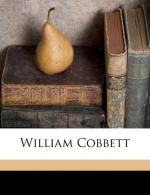|
This section contains 7,321 words (approx. 25 pages at 300 words per page) |

|
SOURCE: "Cottage Economy," in William Cobbett and Rural Popular Culture, Cambridge University Press, 1992, pp. 107-24.
In the following chapter, Dyck discusses the background, intent, and critical reception of Cottage Economy.
In 1823 The Edinburgh Review imposed a sudden if temporary ceasefire in its fifteen-year battle with Cobbett's politics and economics by declaring his new work Cottage Economy to be 'an excellent little book … abounding with kind and good feelings, as well as with most valuable information'. The Review (Henry Brougham was the author of the praise) recognized that Cobbett's work was addressed to 'them', or 'the labouring classes', but it encouraged the rich to enlist the text in Whig educational service as a 'really useful' publication. Tories, for their part, did not publicize their opinions on Cottage Economy, but much of Cobbett's enthusiasm for an independent cottage economy was echoed in Robert Southey's essays on the 'peasantry' for The...
|
This section contains 7,321 words (approx. 25 pages at 300 words per page) |

|


